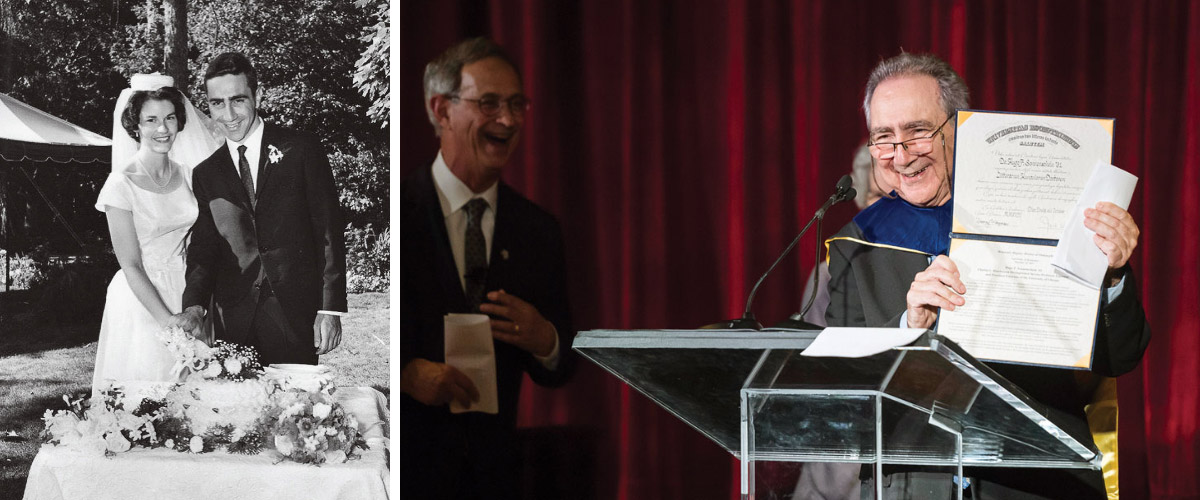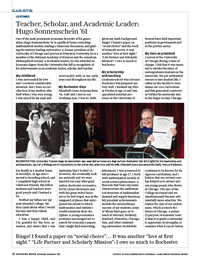Class Notes
 ROCHESTER TIES: University Trustee Hugo Sonnenschein was awarded an honorary degree from Rochester this fall (right) for his
leadership and achievements, part of a lifelong set of connections to the University, where he and his wife, Elizabeth Gunn
Sonnenschein (left), met as freshmen. (Photo: Courtesy of Hugo Sonnenschein ’61 (wedding); J. Adam Fenster (honorary degree))
ROCHESTER TIES: University Trustee Hugo Sonnenschein was awarded an honorary degree from Rochester this fall (right) for his
leadership and achievements, part of a lifelong set of connections to the University, where he and his wife, Elizabeth Gunn
Sonnenschein (left), met as freshmen. (Photo: Courtesy of Hugo Sonnenschein ’61 (wedding); J. Adam Fenster (honorary degree))One of the most prominent economic theorists of his generation, Hugo Sonnenschein ’61 is equally at home crunching mathematical models, leading a classroom discussion, and guiding the nation’s leading universities. A former president of the University of Chicago and provost at Princeton University, he is a member of the National Academy of Sciences and the American Philosophical Society. A Rochester trustee, he was awarded an honorary degree from the University this fall in recognition of his achievements as an academic leader, scholar, and teacher.
My childhood
I was surrounded by love and I received considerable attention. But I have no recollection of my mother, who died when I was very young. I was raised by my aunt and her family in a modest home in Brooklyn. At age nine I moved to boarding school, and I completed high school at Oakwood Friends. My fellow students and teachers were good people and I learned a lot.
Neither my father nor my aunt attended college. Yet they cared about what I would become and they valued education.
I was a happy child, and I’m grateful for the love, attention, and values that I was surrounded with in my early years and throughout my life.
My Rochester days
Elizabeth Gunn Sonnenschein ’61, ’62N and I met in our freshman year. I was 16. Beth maintains that I looked 12. However, she eventually took me seriously and we were married one year after graduation. Rochester economics, led by Lionel McKenzie and with the great Nobel laureate to-be Bob Fogel, was in the vanguard of places that anticipated the extent to which mathematics and statistics would transform their discipline. A young economics professor encouraged me to search for economics papers that I might find interesting, given my math background. Bingo! I found a paper on “social choice” and the work of Kenneth Arrow. It was another “love at first sight.” “Life Partner and Scholarly Mission”: I owe so much to Rochester.
My scholarship and teaching
Graduate school was a breeze. Rochester had prepared me very well. I finished my PhD at Purdue at age 23 and was appointed assistant professor at the University of Minnesota. I was promoted to full professor at age 27. I work with mathematical models of social science phenomena. A theorem that bears my name characterizes the mathematical structure of multimarket demand and supply functions. My proudest achievements include the extraordinary success of my students, some of whom have gone on to teach at Harvard, Berkeley, Stanford, Princeton, Chicago, Yale, and other outstanding universities worldwide. Several have held important positions in government and in the private sector.
My time as president
I served at the University of Chicago during a time of change. I felt that it was essential to elevate the place of undergraduate students at the university. We put substantial resources into student life. I called on the faculty to reexamine our core curriculum and this generated controversy within the university and in the larger society. Chicago continues to be known for its rigorous curriculum, and I believe that our revised core has helped us to attract serious young people who thrive at Chicago. The size of the College increased and we simultaneously became substantially more selective. We tripled the size of our endowment, which protects the future of Chicago. A primary purpose of academic leadership is to guide a university to appreciate its strengths, to examine what it can do better, and to help it to serve society. We are expected to lead the cheers, but we must also hold up a mirror. Great universities need to be challenged. I am immensely proud of the quality of faculty and students who came to Chicago during my tenure as president. Two were subsequently awarded the Nobel Prize, and a third, admittedly a half-time appointment in our law school, went on to become President Barack Obama.
My service as a trustee
I have spent considerable time with the trustees of Chicago, Princeton, and Rochester. These universities have a unique ability to make this a better world. Especially, if one values democracy and appreciates the importance of ideas and a well-educated citizenry. Rochester trustees have been generous with their contribution of resources. But more important has been their wisdom, their different perspectives, and their critical understanding of the discovery and learning that goes on at Rochester. The trustees work in support of an outstanding faculty and superb academic leadership. It has been an honor to serve with such a dedicated and talented group.
My life today
I am in my Chicago office most every day. Beth is a retired cancer epidemiologist. We serve on boards, with a tilt toward advanced learning, child welfare, and community service. Our grandchildren are at universities in D.C., England, New York, and Chicago. They will make the world a better place. We stalk them! We remain in contact with Rochester classmates, and we enjoy theater, biking, and music. Beth belongs to a recorder group. It is a long way from Brooklyn. Some of what has been most formative began at Rochester. Meliora!
—As told to Robin L. Flanigan

